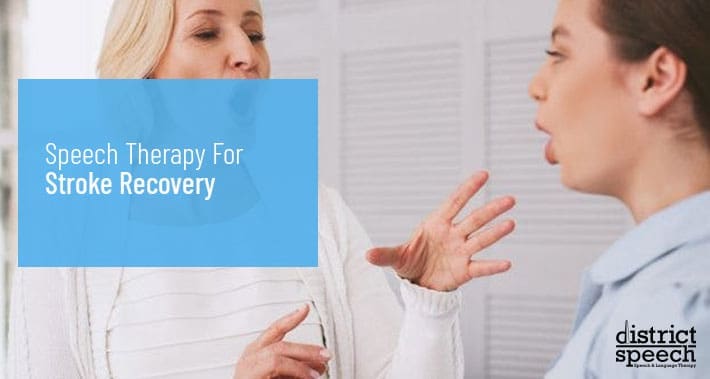
If you or someone you know has suffered a stroke, you know how troublesome the results can be.
But in fact, they tend to vary widely.
In some cases, the results of a stroke are fairly mild.
In other cases, they can be debilitating.
However, in every case, there are adult speech therapy treatments that can help.
Read on to find out more about stroke, and how one of our Washington DC speech therapists can help.
What Is A Stroke?
Stroke is the fifth leading cause of death in the United States.
Strokes are also one of the leading causes of disability.
A stroke is caused when the flow of blood to your brain is interrupted.
Blood flow can be interrupted in a couple of ways.
One possibility is if you have a blood clot.
A blood clot keeps blood from flowing through the affected vessel.
This means that less blood can flow into your brain.
The other possibility is a ruptured blood vessel.
If one of your blood vessels ruptures, that prevents your blood from flowing through it and into your brain.
But why is blood flow to your brain so important?
Your brain is a very complex organ and controls all of your body’s functions.
When you have a stroke, it can affect multiple parts of your body including speech, fine motor skills, and gross motor skills.
Let’s take a closer look at some of these effects.
What Are The Effects Of A Stroke?
If you have a stroke, it will usually affect either the right side or the left side of your brain.
Depending on the side of your brain the stroke effects, your symptoms can vary widely.
The long term effects of experiencing a stroke can also vary depending on which side of your brain was affected.
Immediately after experiencing a stroke, you may notice symptoms that include:
- Trouble speaking
- Trouble understanding what others are saying
- Severe headache
- Vomiting
- Difficulty walking
- Sudden numbness or paralysis in your face, arm, or leg
- Vision problems in one or both eyes
RELATED: Signs And Risks Of A Stroke
There are also a variety of long term complications if you experience a stroke.
These might include things like:
- Difficulty with speech
- Difficulty swallowing
- Emotional problems or depression
- Pain or numbness
- Paralysis or muscle problems
- Memory loss
One other problem that can occur is aphasia.
Let’s take a closer look at this symptom.
Stroke And Aphasia
The left side of your brain is the side that controls your speech, although damage to the right side of your brain can sometimes cause speech problems as well.
If you’ve had a stroke on the let side of your brain, you might begin to experience aphasia.
Aphasia can cause trouble understanding other people when they speak.
You also may find you have difficulty with spoken and written words, difficulty with word retrieval, or difficulty producing full sentences that make sense.
If you have aphasia, you might be frequently misunderstood.
You might find that people may think you aren’t as smart as you used to be.
Struggling to communicate like this can feel isolating.
According to the National Aphasia Association, about a third of those who suffer from a stroke will have some sort of aphasia.
Have you or a loved one suffered a stroke and are having difficulty reading, speaking or writing?
You may be suffering from aphasia.
RELATED: How To Communicate With An Adult With Aphasia

Speech Therapy Exercises For Stroke Recovery
The type of aphasia you experience will also determine what symptoms you have.
Symptoms can range from difficulty forming complete sentences to using the wrong words or speaking in jumbled sentences.
The good news is that speech therapy can help with most symptoms of aphasia.
Trouble understanding words or the inability to think of the “right” word in a situation can also improve with the adoption of the following useful exercises:
1. Breathing Exercises
Most of the aphasia symptoms we’ve discussed have revolved around language.
However, aphasia can sometimes cause you to struggle to regulate your breathing.
This also has an impact on your language skills.
When you can’t regulate your breathing properly, it makes it harder to speak at length.
You might also find yourself taking breaths in the middle of sentences.
This can affect your ability to communicate and lead to being misunderstood.
Breathing exercises can help you learn how to control your breathing when communicating.
A speech therapist can help you learn to plan out the breaths you’ll take during a phrase, and practice sentences with breathing included.
2. Matching Pictures To Spoken Words
Do you find yourself using a word for something that’s close but not quite right to the word you’re trying to use?
If so, you can correct this by matching pictures to spoken words.
You may also have trouble bringing a word to mind when thinking of a specific image.
Looking at a picture while speaking the word aloud can strengthen the connection between words and things.
Practice saying the word aloud multiple times to reinforce the pronunciation and remember how to form the word.
3. Practicing Words And Sounds
Finding the right words and making the right sounds can be a challenge for stroke survivors.
Try repeating similar sounds together in a row, several times per sound, and then move on to the next sound.
For example: “Ah, ay, at, al, ack…”
Focus on making the sound as clear and easy to understand as possible.
Focus on producing a big sound, to strengthen your throat and be heard.
You can do the same repetition with whole words, increasing the difficulty of the word as you progress.
4. Practicing Full Sentences
If you’re recovering from a stroke, it’s likely you’ll have trouble forming complete sentences.
Practice constructing sentences, or read them aloud if you’re able.
This exercise can also be combined with some of the other exercises above.
For example, you can put a word into a sentence once you have practiced naming it using a picture.
Book Your Appointment With District Speech Today
Have you or a loved one recently suffered from a stroke?
If so, you may be frustrated with your newly acquired speech difficulty as a result, but there is hope.
You can improve quite a bit with these exercises and with the help of a speech therapist.
Book your appointment with District Speech today.
1300 I St NW, Suite 400 E,
Washington, DC 20005
- https://g.page/districtspeech
District Speech and Language Therapy specializes in speech therapy, physical therapy, and occupational therapy solutions, for both children and adults, in the Washington D.C and the Arlington Virginia areas.